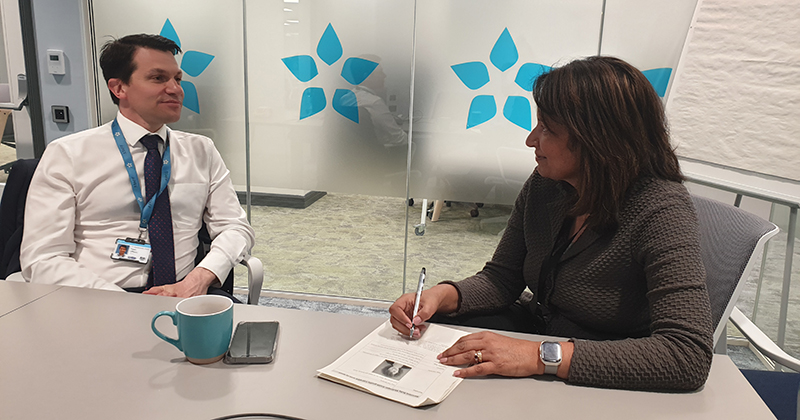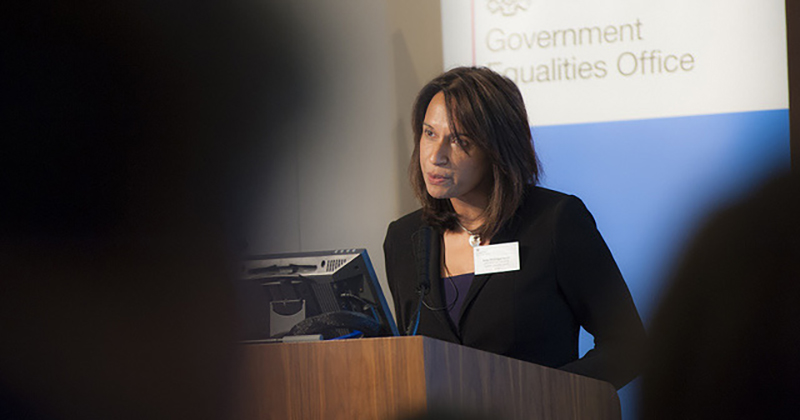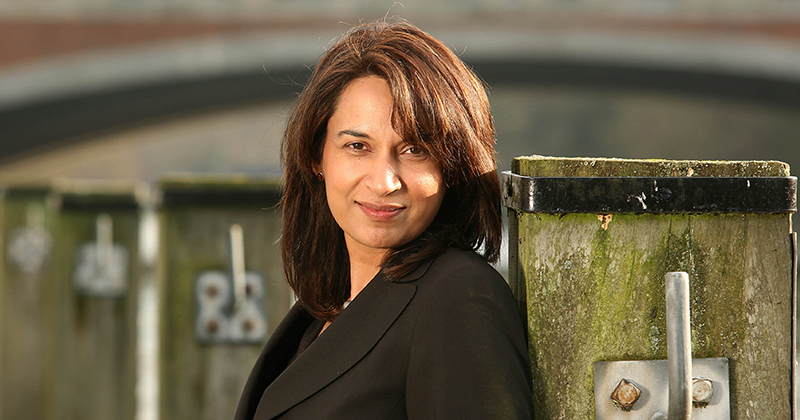Baroness Ruby McGregor-Smith, who became chair of the Institute for Apprenticeships and Technical Education in August, is overseeing 280 staff and huge responsibilities. What makes her tick? Jess Staufenberg finds out
Baroness Ruby McGregor-Smith is telling me a story. She remembers being chief executive of Mitie, a facilities management outsourcing company, and talking to a young black apprentice at the firm.
“I was talking to him about race in the workplace, saying, ‘I think I understand some of the issues.’
“And this young apprentice said to me, ‘You really don’t get it, do you? When you were young, you had to adapt the way you were to fit in. So by the time you had got through education and came into the workplace, you were used to walking into a very white workplace.’”
In contrast to McGregor-Smith’s experience of living in a largely white neighbourhood and community, the apprentice said they had always been surrounded by people who looked like them. This role, at the company, was the first time they were in a white-dominated environment.
“I’ve been in a gang,” they explained. “I walk into our offices, and I don’t know where to start or what to do.”
McGregor-Smith leans back in her chair in our glass-walled meeting room in Sanctuary Buildings, Department for Education. “I had assumed I could connect, and our experiences could connect. But our experiences were very different,” she continues.
“That’s why a mentor is so important, to bring individuals together to have those conversations, to make sure your workplace is welcoming.”

This sort of careful insight about the subtleties of inclusivity and representation seems characteristic of McGregor-Smith.
It’s rooted in her own experiences: growing up in an environment in which she felt different to almost everyone else around her – far from a community, or wider family, to whom she clearly belonged.
The former business executive arrived in London from Lucknow in India with her mother in 1965, aged just two years old.
Her father had travelled ahead, with only a plane ticket to his name, and the young McGregor-Smith remembers a loving, but lonely, childhood while her parents were out working hard.
Her two sisters arrived 11 years after her, and she says she was “not a fan” of living so long without siblings.
“I remember a really deep sense of loneliness,” she says. At that time, communicating with family in India (she has a big family, with 54 first cousins) involved writing a letter which took six weeks to arrive, or booking in a timeslot with BT just to make one call.
Meanwhile, her parents were so poor initially that McGregor-Smith recalls them being in tears when she outgrew her first pair of shoes. At primary school, she was the only Asian child, and at secondary school, one of just a small group.
“It was that feeling you really were on your own. I was this little girl, growing up in an environment that was pretty hostile.”
A love of sport – netball, running and high jump – brought relief at secondary school, but the familial expectation she should study medicine led McGregor-Smith to take science A-levels she didn’t enjoy and get lower grades than she would have liked.
“I should have been doing T Levels!” she says emphatically. “I needed applied work.” She took her own path to study economics at Kingston Polytechnic, and after that qualified as an accountant with BDO, the global accountancy firm.

But she wanted to work in industry rather than audit, and so joined “a group of people working in a warehouse in Sunbury-on-Thames”. That small group was to become Serco, now the giant outsourcing company.
Aged 28, McGregor-Smith became the finance manager and was one of just a few women at the company. It was here she felt properly welcomed and mentored. Founder Richard White said she had “the potential to get to the top”. “I’m forever indebted to him,” she adds.
Having found a space in which she felt supported, the next big challenge in McGregor-Smith’s life was leaving that environment. After nine years at Serco, she had two children and found the juggling act was impossible.
“That was a really tough time. I had underestimated it – I love kids, but I was just so tired. I had come to the conclusion that this big career I had, something had to give, so what had to give was my career.
“I made a decision people don’t often make at my level.”
Stepping off the career ladder was “a hugely risky and traumatic thing to do. I was hugely committed to Serco and the senior executive team”. Aged 37, she took time with her family for two years.
Like many parents, McGregor-Smith felt torn. “I felt guilty about everything – guilt, guilt, guilt was the overriding emotion of some of those early years.”
Then at 39, she was approached to become chief financial officer at Mitie. The company clearly won her loyalty: she remembers again worrying about whether to watch her son in the school nativity play or attend some shareholder meetings. Then-chief executive Ian Stewart said to her: “It’s pretty easy – there’s only one nativity play.”
The flexibility and support paid off. McGregor-Smith stayed with the company and went on to become chief executive in 2007, which meant she was the only Asian female CEO of a FTSE 250 company. She had increased its turnover by more than £2 billion by 2012.
She was then approached by Theresa May to chair the Women’s Business Council, launched the same year to tackle the gender pay gap.
So although McGregor-Smith had a different experience to the young apprentice she talked to, she understands one thing very well: everyone wants to feel they belong, in education and work.
“Fitting in is so hard when you’re different. I craved to fit in. I don’t want to be different, I want to fit in.” Even now, she notes, “When I walk into the Institute for Apprenticeships, there aren’t many people who look like me. I would like a few more.”
Her answer to the problem is mentoring, she says, and she wants this approach used to tackle the drop-out rate of apprentices. (In 2020/21, a staggering 47 per cent of apprentices dropped out.)
“It’s about making sure your workplace is more welcoming. One of the challenges around the drop-out rate is about, how welcome do they feel? How nurtured?” says McGregor-Smith firmly. “When you have a good manager who is supporting and mentoring you, people tend to stay.”
McGregor-Smith formalised these suggestions in a 2017 review she led called ‘Race in the Workplace’. Mentors and mentoring is mentioned more than 70 times, and one of its key recommendations to employers is to provide mentoring and sponsorship for employees.
Since becoming IfATE’s chair in August (paid £29,500 annually for one day per week), it’s not just race that’s on her agenda. She is not a fan of recruitment quotas but she wants strategies towards ambitious targets (such as a proportion of the workforce coming from particular backgrounds, or identities).
“We don’t have enough targets around disabilities,” she says with frustration.
One of the IfATE board members, Robin Millar, is a globally known music producer and is blind. He has shown McGregor-Smith the dismal statistics on blind people in employment. “Why haven’t we adapted the workplace to be more welcoming?”

While at Mitie, she also supported calls for prisoner apprenticeships through working with the charity Clink at Brixton Prison: “It’s a natural rehabilitation piece.” She adds: “I’m also very keen not to have an age limit on apprenticeships. I want us to start thinking differently around age.”
But mentoring is also not enough to tackle apprenticeship drop-out and low start numbers, she acknowledges. “We’ve got a huge crisis in terms of cost of living this year, and I would encourage employers to look at pay rates to support the most disadvantaged.”
As chair of IfATE, McGregor-Smith says she can’t make specific calls for greater pay for apprentices, but she does want to do more work at IfATE around career paths. “For me it’s about the progression piece. At IfATE we will be supporting more around occupational maps.”
With apprentice minimum pay at just £4.81 an hour, an occupational progression map attached to each standard sounds like a much-needed, excellent idea.
And what about employers and training providers? The Association of Employment and Learning Providers has explained that some smaller SMEs find the digital accounts for the apprenticeship levy off-putting.
“I personally believe what we’ll see with the levy is making sure it’s more attractive to SMEs,” responds McGregor-Smith. She points out that Serco was an SME once. “SMEs are the lifeblood of the nation.”
Let’s have occupational maps for apprentices
The other area facing teething issues are T Levels. FE Week recently ran an excellent piece from a staff member at Bury College, explaining what tweaks would help the qualification work on the ground (including reducing the size of the qualification, and standardising the size across the different subject areas).
McGregor-Smith says this kind of feedback will be vital going forward.
“You’ve got the first group of learners going through now, and what you will have coming out is data on what the experiences have been like,” she explains, adding: “If I take you forward five years, it’s very likely some [elements of T Levels] will have changed. It’s still early days, and we’ve got to be pragmatic all the way through this.”
She adds, as a personal philosophy: “I’m all for evolution, rather than revolution.”
It’s clear that McGregor-Smith has steadily, and successfully, built herself up from the ground – and this is reflected in her approach to IfATE’s own work.
My only challenge is that education only happens once for most people. Qualifications probably need to be as perfect as possible first time round, especially for disadvantaged learners.
Brands can also take a long time to recover from an initial rash of bad press, so evolution might carry significant risk.
But McGregor-Smith’s commitment, and business nous, is not in question. “We’re in the next phase of growth,” she smiles.









Your thoughts